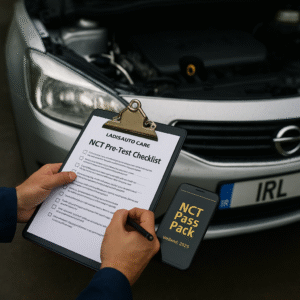Understanding the Check Engine Light
The check engine light, an integral component of modern vehicles, serves as an early warning system designed to notify drivers of potential issues within their car’s engine or emissions system. Located on the dashboard, this light is part of the onboard diagnostics system (OBD-II) and is essential for maintaining the vehicle’s health and performance.
Typically, the check engine light can manifest in two distinct ways: a steady light or a flashing light. A steady check engine light usually indicates a non-urgent issue, such as a loose gas cap or a minor sensor malfunction. While it should not be ignored, it does not require immediate attention. On the other hand, a flashing check engine light is a sign of a potentially severe problem that demands immediate action. This could be indicative of engine misfires, which can lead to significant damage if not promptly addressed.
There are several common reasons why the check engine light might illuminate. Emissions control issues are a frequent cause, often stemming from problems with the catalytic converter, oxygen sensors, or the exhaust gas recirculation (EGR) valve. Sensor failures, such as those involving the mass airflow sensor or manifold absolute pressure sensor, can also trigger the light. Additionally, engine misfires, which can result from faulty spark plugs, ignition coils, or fuel injectors, are critical issues that can cause the check engine light to flash.
It is crucial for drivers to recognize the urgency associated with a flashing check engine light. This alert is often a sign of severe problems that could lead to catastrophic engine damage if not addressed immediately. Ignoring a flashing check engine light can result in costly repairs and potentially hazardous driving conditions. Therefore, understanding the function and signals of the check engine light is vital for ensuring the longevity and safety of your vehicle.
Common Causes for a Flashing Check Engine Light
When your car’s check engine light begins to flash, it is indicative of a serious issue that requires immediate attention. One of the most common causes is engine misfires. Engine misfires occur when the combustion process within the engine cylinders is disrupted. This can be due to faulty spark plugs, ignition coils, or fuel injectors. Engine misfires not only affect the vehicle’s performance, leading to rough idling and decreased fuel efficiency, but they can also cause long-term damage to the engine if not addressed promptly.
Another significant cause for a flashing check engine light is damage to the catalytic converter. The catalytic converter plays a crucial role in reducing harmful emissions by converting toxic gases into less harmful substances. Problems with the catalytic converter can arise from engine misfires, which allow unburned fuel to enter the exhaust system. This can cause the catalytic converter to overheat and fail, leading to increased emissions and potential engine damage.
Issues within the ignition system can also trigger the check engine light to flash. The ignition system includes components such as the spark plugs, ignition coils, and the ignition control module. Any malfunction in these parts can lead to incomplete combustion, resulting in misfires and poor engine performance. Regular maintenance and timely replacement of these components can prevent such issues from escalating.
Fuel system problems, such as a clogged fuel filter or a malfunctioning fuel pump, can likewise cause the check engine light to flash. These issues hinder the proper delivery of fuel to the engine, leading to performance problems and potential engine damage. Ensuring that the fuel system is clean and functioning correctly is essential for maintaining optimal engine performance.
To accurately diagnose the exact cause of a flashing check engine light, it is highly recommended to use diagnostic tools like the Auto Query and the Auto Query Pro. These tools can read the vehicle’s diagnostic trouble codes (DTCs), providing precise information about the underlying issue, and enabling timely and effective repairs.
What to Do When Your Check Engine Light Flashes
When the check engine light on your vehicle’s dashboard begins to flash, it is crucial to take immediate action to prevent potential damage to your engine. The first step is to safely pull over to the side of the road and turn off the engine. This will help to avoid further damage while you assess the situation.
Once you have pulled over, check for any obvious issues that might be causing the light to flash. Common problems include a loose gas cap or low oil levels. Tighten the gas cap if it appears to be loose, and check the oil level using the dipstick. If the oil level is low, add oil to the engine but be careful not to overfill.
After addressing these basic checks, it is highly recommended to consult a professional mechanic as soon as possible. A flashing check engine light often indicates a severe problem that requires expert attention. A mechanic will use diagnostic tools to pinpoint the issue and provide appropriate solutions.
In the meantime, utilizing diagnostic tools like the Auto Query and the Auto Query Pro can be extremely beneficial. These tools offer quick and accurate diagnostics, helping you understand the severity of the problem and whether it is safe to continue driving your vehicle. By connecting these tools to your car’s OBD-II port, you can receive real-time data and error codes, which can then be shared with your mechanic for a more efficient repair process.
Taking immediate and informed action when your check engine light flashes can prevent costly repairs and ensure your vehicle remains safe and reliable. Always prioritize consulting with a professional to address any underlying issues comprehensively.
Preventive Measures to Avoid Future Issues
To mitigate the risk of your car’s check engine light flashing unexpectedly, adopting proactive preventive measures is crucial. Regular vehicle maintenance stands as the cornerstone of a well-functioning automobile. One of the primary steps is adhering to a consistent schedule for oil changes. Fresh oil ensures that the engine operates smoothly and reduces wear and tear on critical components. Neglecting this can lead to buildup and potential engine damage, which might trigger the check engine light.
Another crucial aspect is the timely replacement of spark plugs. Spark plugs play a vital role in the engine’s combustion process. Over time, they can become worn or fouled, leading to misfires that can illuminate the check engine light. Regular inspection and replacement, as recommended by your vehicle manufacturer, can prevent this issue.
Ensuring the cleanliness of the fuel system is equally important. Over time, fuel injectors and other components can accumulate deposits that hinder performance and efficiency. Using high-quality fuel and fuel system cleaners can help maintain optimal function and prevent the check engine light from activating due to fuel-related issues.
Routine checks are indispensable for identifying potential issues before they become severe problems. Regularly inspecting belts, hoses, and connections can prevent unexpected failures. Additionally, utilizing diagnostic tools can be exceptionally advantageous. Tools such as the Auto Query and the Auto Query Pro offer ongoing monitoring of your vehicle’s health, providing real-time data and alerts for any irregularities.
Staying proactive in maintaining your car not only helps avoid the inconvenience of a flashing check engine light but also extends the lifespan of your vehicle. By incorporating these preventive measures into your routine, you can ensure a smoother, more reliable driving experience and mitigate the risk of severe issues arising in the future.





